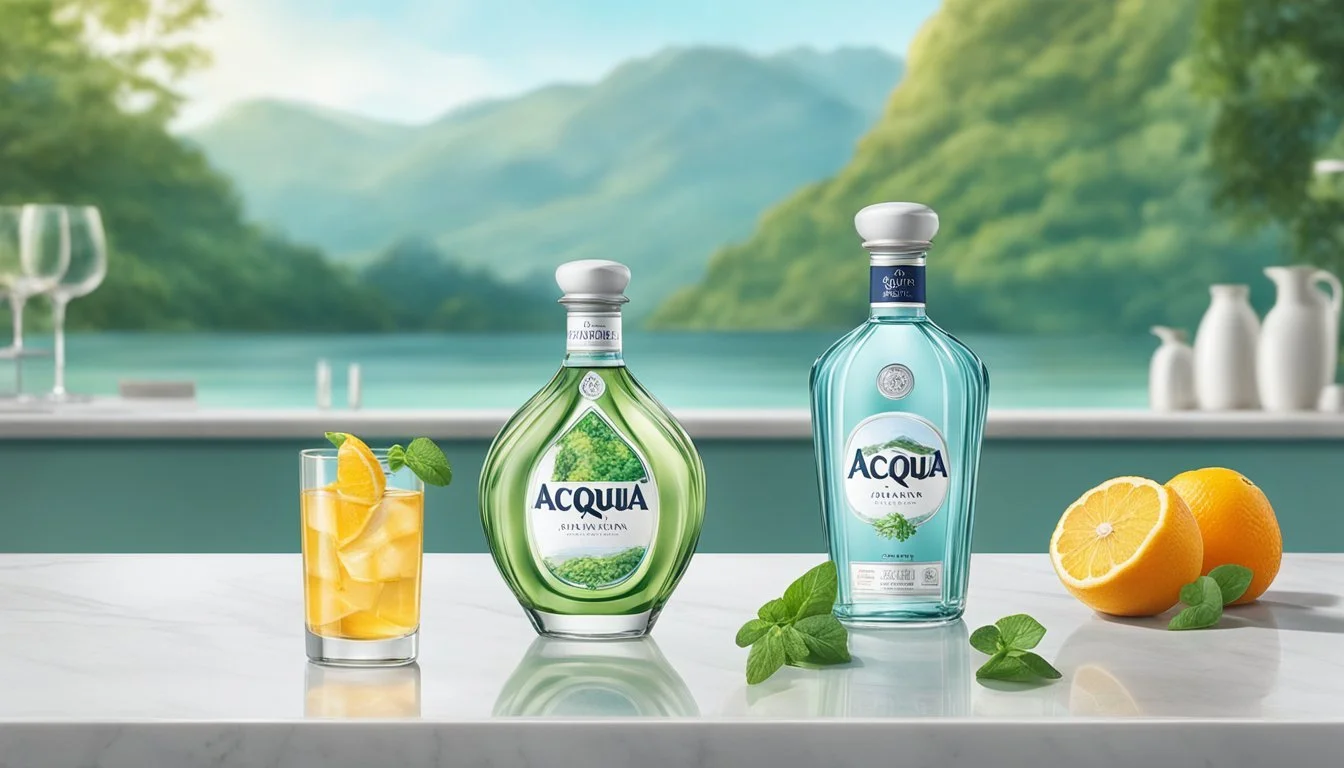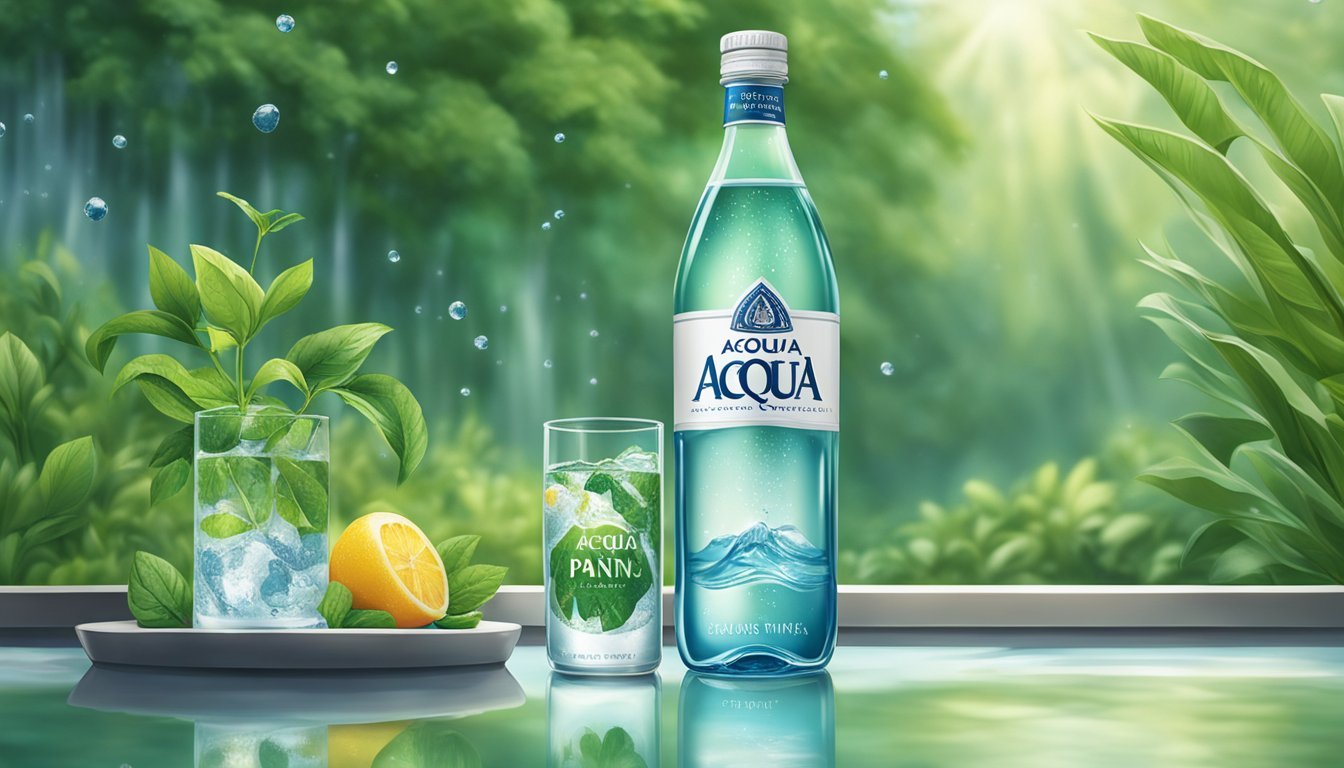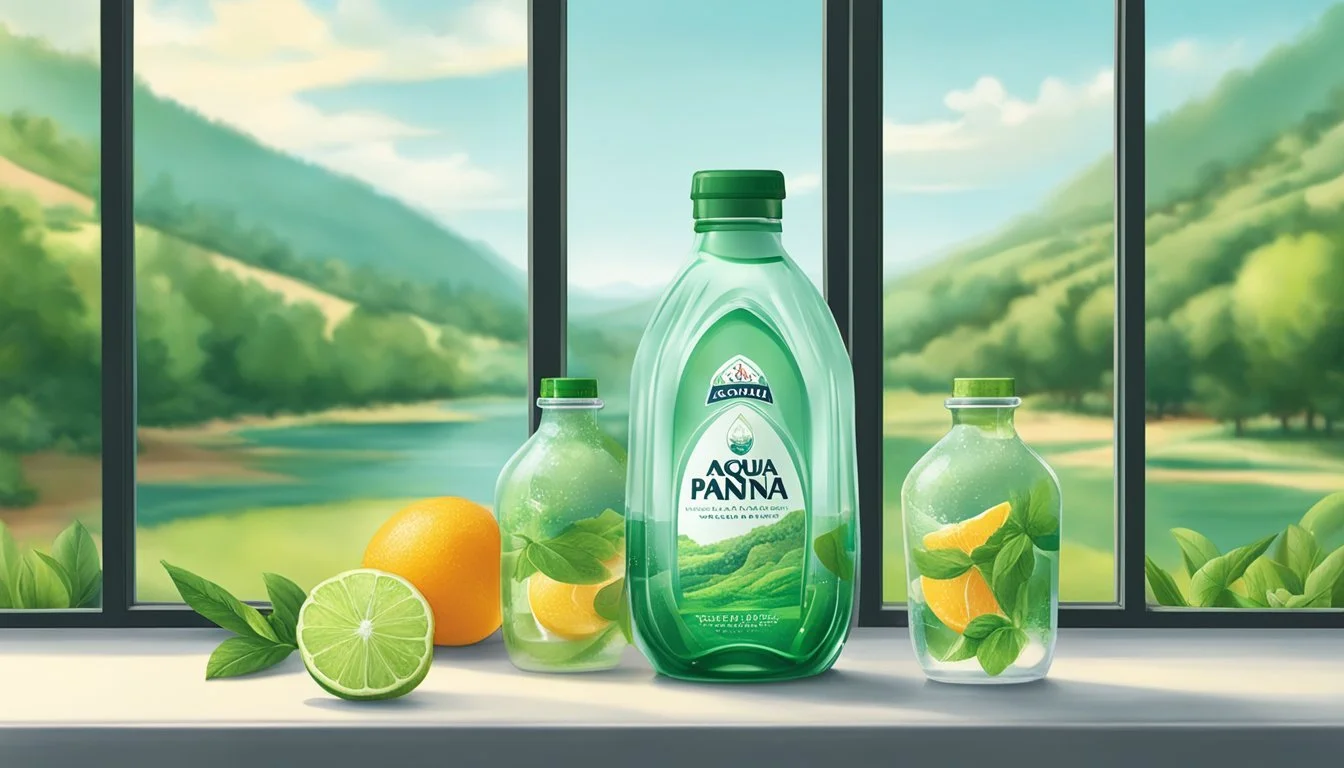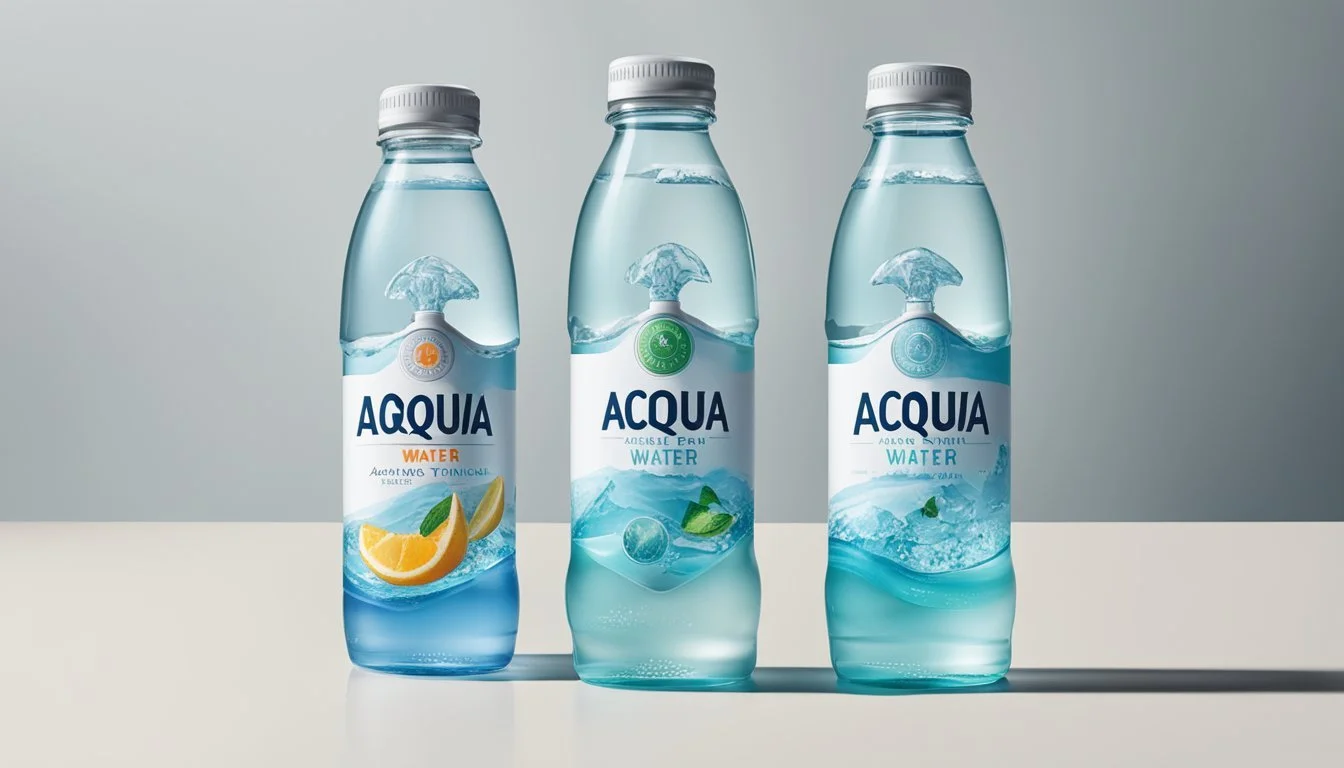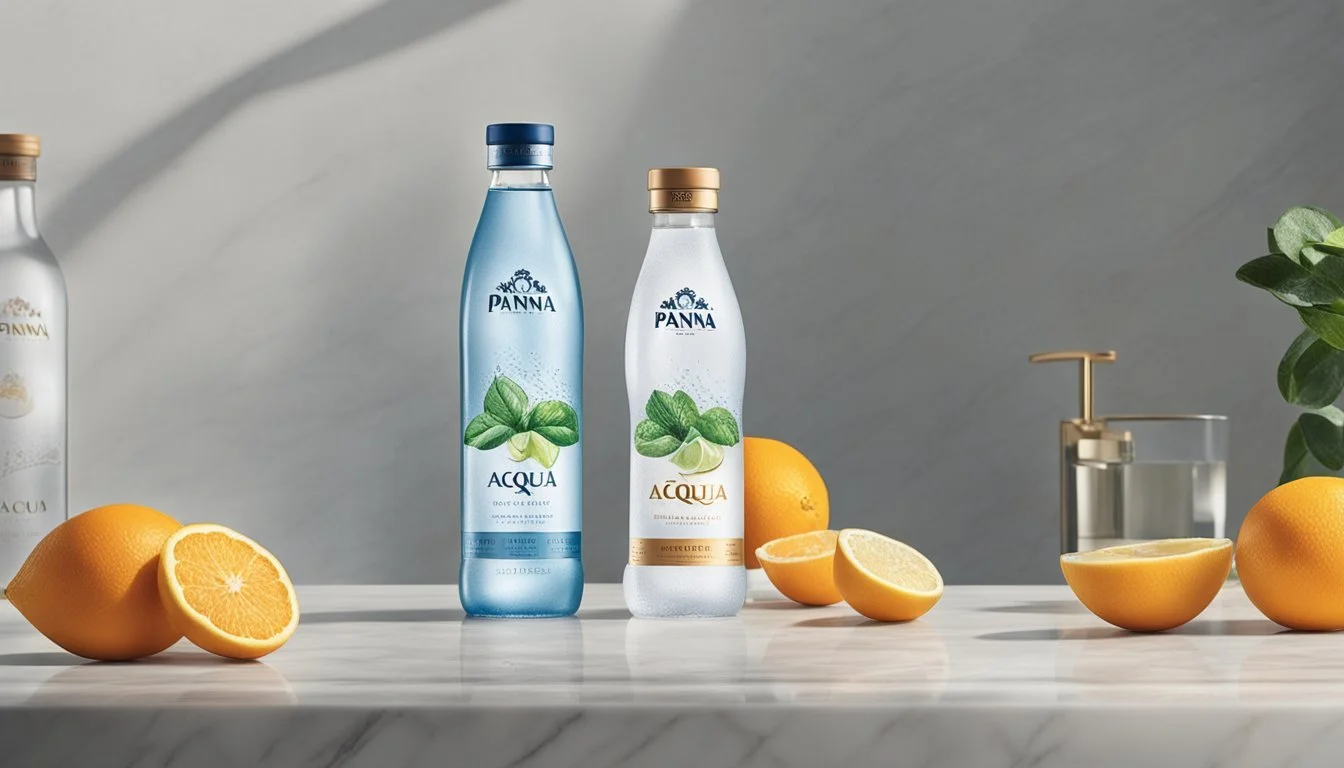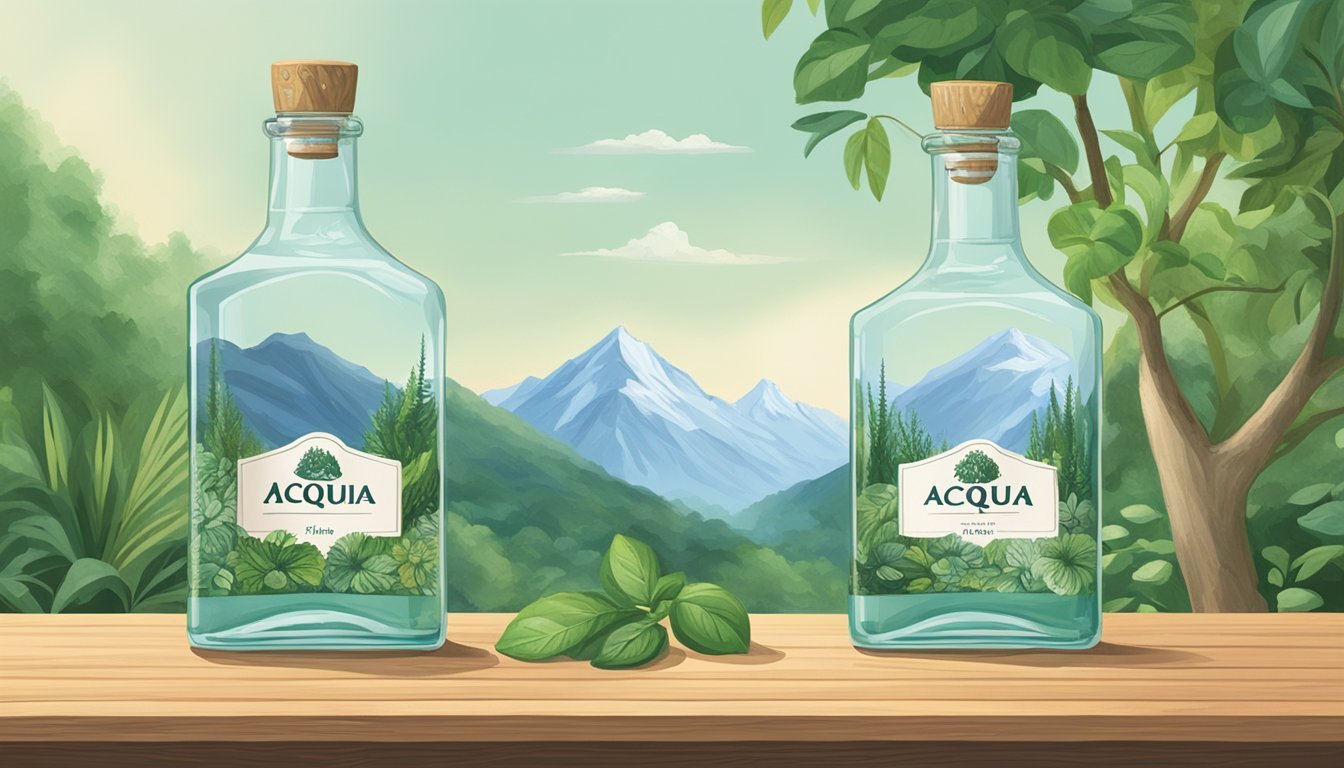Acqua Panna vs. Ethos
Comparing Quality and Taste in Bottled Water
With a myriad of bottled water brands available in the market, consumers are often faced with the challenge of selecting the best one for their tastes and health preferences. Two notable contenders in the bottled water arena are Acqua Panna and Ethos. Acqua Panna, hailing from Tuscany, Italy, touts its origin from the serene hills of the Apennines, offering a smooth and silky taste that's often associated with fine dining experiences. Ethos, on the other hand, is a brand that not only promises a clean and pure taste but also includes a socially responsible angle, with a portion of its profits directed towards humanitarian water programs.
Choosing between Acqua Panna and Ethos involves a comparison of taste, source, purification process, and the brands' commitments to environmental and social initiatives. Acqua Panna's natural filtration through the earth and its balanced mineral content give it a distinctive taste profile that's appreciated by connoisseurs around the world. Ethos Water, distributed by Starbucks, aligns itself with ethical consumerism, aiming to provide access to clean water in developing countries through its sales.
The debate over Acqua Panna versus Ethos ultimately depends on personal preference and values. Where Acqua Panna's reputation is built upon its luxurious appeal and natural origins, Ethos emphasizes its ethical mission. Consumers weigh these factors when selecting the bottled water that best suits their needs—whether it be the pursuit of refined taste or the desire to contribute to a worthy cause.
The Basics of Bottled Water
When exploring bottled water options, consumers encounter a diverse range of products, each defined by its source and treatment process. These characteristics significantly influence the taste, quality, and market position of the water.
What Is Bottled Water?
Bottled water is water that has been packaged in plastic or glass bottles for consumer usage. It is available in various forms, including spring water, mineral water, alkaline water, and purified water. The bottling process often involves filtering and sterilization to ensure safety for drinking.
Spring Water: Water collected from a natural spring, where it flows to the surface from an underground aquifer.
Mineral Water: Water from a mineral spring containing various minerals, such as salts and sulfur compounds.
Alkaline Water: Water that has a higher pH level than regular drinking water, often enhanced with ionizing processes.
Purified Water: Water that has been filtered or processed to remove impurities and contaminants.
Types of Bottled Water
Bottled water also varies by its carbonation levels. Consumers may choose between:
Sparkling Water: Infused with carbon dioxide gas under pressure, making it effervescent.
Still Water: Without the addition of carbonation, this water is calm and flat.
Bottled water brands differentiate themselves through these characteristics, competing on factors like taste, purity, and mineral content.
Brand History and Origins
Exploring the roots of Acqua Panna and Ethos Water reveals a rich tapestry of cultural heritage and modern mission-driven enterprise. Each brand's origin tells a unique story, embedded in the legacy of their founding principles.
Acqua Panna Background
Acqua Panna takes its name from Villa Panna in the scenic hills of Tuscany, Italy, where its natural spring was first discovered. The brand boasts a storied past that can be traced back to the Renaissance period. The Medici family, known for their patronage of arts and intellect, enjoyed the waters from the source located between Scarperia and Barberino del Mugello, which sits at an altitude of 900 meters. Official bottling of Acqua Panna water began in 1880, making it one of the oldest bottled water companies. Today, it is a part of Nestlé Waters' portfolio, renowned for its smooth taste and natural purity.
Ethos Water Background
Ethos Water presents a stark contrast, with its roots in the 21st century and a mission to address global water crises. Established in 2001, Ethos was founded with the purpose of providing children access to clean water. It gained prominence after a successful partnership with Starbucks in 2005, which boosted its distribution and visibility. Unlike Acqua Panna, Ethos Water does not derive from a historical spring, but rather sources its water with a focus on ethical consumerism. Owned by Starbucks, Ethos contributes a portion of each sale to support water, sanitation, and hygiene education programs in water-stressed countries, embodying a modern take on the bottled water industry.
Water Source and Processing
When examining the uniqueness of bottled water, the source and the treatment process play critical roles in determining quality. Acqua Panna and Ethos water brands each have distinct methods and sources that define the purity and taste of their products.
Acqua Panna Natural Spring
Acqua Panna sources its water from a natural spring located in Tuscany, Italy. The spring emerges within an area rich in natural beauty and geologic significance, as the water filters naturally through limestone and volcanic rock. This process enriches the water with minerals and provides its renowned soft and smooth taste. The journey of the water begins in the Apennines Mountains, where it takes an estimated 13 years to flow through the underground aquifer before reaching the surface. No additional treatment or filtration is administered, preserving the natural composition of the water.
Ethos Water Purification
In contrast, Ethos Water originates from multiple municipal water sources and undergoes a rigorous purification process. This includes a proprietary method known as Hydro-7™, which is Ethos's seven-step filtration process designed to remove impurities. Steps within this method likely encompass techniques such as reverse osmosis and other filtration practices, although the specific details of each step are not publicly disclosed. The primary goal for Ethos is to produce a clean, pure water while contributing to their charitable mission of providing access to clean water in developing countries. Ethos is less about the source and more about the ethical approach and the processing.
Taste and Quality
When assessing bottled waters like Acqua Panna and Ethos, one must consider two crucial aspects: the tasting profile and the adherence to quality standards.
Tasting Profile
Acqua Panna is renowned for its smooth and subtly sweet taste profile, often attributed to its source in the Apennine Mountains of Italy. Without any overbearing flavor, it is preferred by those seeking a light and balanced mineral content in their water, with a neutral to slightly alkaline pH that is typically above 7 but below the level of alkaline brands like Essentia. Ethos water, in contrast, sourced for Ethos' mission-driven initiatives, offers a taste that is clean and pure, but it might not be as distinctive in mineral content compared to Acqua Panna.
Quality Standards
Both brands maintain strict quality controls and comply with all regulatory standards. However, Acqua Panna takes it further with its commitment to preserving the purity and naturalness of its source. This is reflected in its lack of bitterness and its ability to maintain stability in taste despite varying pH levels, a characteristic not all bottled waters share, such as Evian, which might have a slight mineral aftertaste. Ethos too provides quality water, with Ethos' emphasis on charitable contributions not interfering with its commitment to delivering safe and refreshing bottled water.
Health and Hydration
When evaluating bottled waters like Acqua Panna and Ethos, it's critical to consider their hydration effectiveness and the mineral content they offer.
Hydration Benefits
Both Acqua Panna and Ethos provide essential hydration. Hydration is crucial for maintaining bodily functions, as it helps regulate body temperature, transports nutrients to cells, and keeps organs functioning properly. Acqua Panna originates from the hills of Tuscany and is known for its natural filtration process, while Ethos, marketed by Starbucks, prides itself on providing clean drinking water drawn from various sources.
Mineral Content and Benefits
The mineral content of bottled water impacts its taste and health benefits. Acqua Panna is naturally endowed with minerals like calcium and magnesium, which are essential for bone health and metabolic functions, respectively. The brand boasts a balanced pH and a smooth taste due to its unique mineral composition.
Mineral Acqua Panna Ethos Water Calcium Present Present Magnesium Present Present Sodium Low Low
Ethos Water also provides minerals but focuses on its ethical initiative; for every bottle sold, a portion of the proceeds goes towards providing clean drinking water to communities in need. While both brands contain electrolytes critical for rehydration, neither should be relied upon as a primary electrolyte replenishment source in scenarios of intense dehydration, such as during severe diarrheal diseases or high-performance athletics. Instead, they serve to maintain adequate hydration levels during regular daily activities.
Environmental Impact
When considering the environmental impact of bottled water brands like Acqua Panna and Ethos, it is important to assess aspects such as packaging sustainability and any environmental initiatives they have undertaken.
Packaging and Sustainability
Acqua Panna and Ethos focus on packaging sustainability to various degrees. Acqua Panna touts its use of recyclable materials, reflective of a broader industry trend. In contrast, Ethos, while also using recyclable bottles, emphasizes the added value of their charitable contributions to clean water initiatives. However, neither brand is typically associated with alternative packaging forms like boxed water, a method that some newer companies use to reduce plastic waste.
List of packaging characteristics for Acqua Panna and Ethos in the bottled water industry:
Recyclable Packaging: Both brands utilize recyclable materials in their packaging.
Carbon Neutral Goals: Some bottled water companies aim for carbon neutrality in their operations, although specific claims by Acqua Panna or Ethos are not widely publicized.
Comparison with Industry: Mainstream brands like Nestle Pure Life, Poland Spring, Dasani, and Aquafina also incorporate recyclability within their products to various extents; however, their larger market share means their overall environmental footprint is significant.
Environmental Initiatives
Regarding environmental initiatives, Ethos Water is distinguished by its Ethos Water Fund, which is dedicated to providing clean water to communities in need. A portion of every Ethos bottle sold goes towards supporting water, sanitation, and hygiene education programs in the developing world. While Acqua Panna does not have a similar fund, it, along with other bottled water brands, may participate in broader Nestle group environmental efforts, given that Acqua Panna is part of the Nestle family of products. The engagement in specific environmental initiatives and the pursuit of sustainable practices such as aiming for reduced carbon footprints or engaging in water stewardship can set a bottled water brand apart in terms of environmental impact.
Consumer Experience
When evaluating Acqua Panna and Ethos bottled waters, consumers often consider the brand's reputation and the practicality of packaging in their lifestyle.
Brand Image and Lifestyle
Acqua Panna, sourced from Tuscany, has a strong reputation associated with gourmet dining and a sophisticated lifestyle. Its brand image is bolstered by its Italian heritage and connection with high-quality culinary experiences. Ethos, on the other hand, is known for its social initiative of supporting water projects in developing countries. This creates an image of a brand that is not only about quality but also about ethical consumption and humanitarian efforts.
Consumers who prioritize eco-conscious living may gravitate towards Ethos for its mission. In contrast, those drawn to luxury and exclusivity might prefer the European allure of Acqua Panna. Major competitors like Fiji and Voss also embody distinct lifestyle images; Fiji with its tropical and pure mystique, and Voss with its minimalist and designer presentation, often in glass bottles which appeal to luxury-focused consumers.
Packaging Convenience
Acqua Panna bottles come in both glass and plastic versions, with the glass bottles often preferred for dining experiences. However, their size and shape can be less accommodating for standard cup holders, which might inconvenience consumers on the go. Ethos offers a more functional design with plastic bottles that are readily portable. Its packaging is designed to fit into everyday life, an approach shared with brands like Icelandic Glacial and Life WTR that prioritize convenience without sacrificing style.
Other brands, like San Pellegrino, often serve a dual purpose – deliver refreshing water while acting as a status symbol. The brand's glass bottles are not as travel-friendly as Ethos’s or more sports-oriented brands that fit in cup holders, making San Pellegrino less practical for consumers seeking hydration on the move.
Whether the consumer values the luxury experience of Acqua Panna or the practical and ethical proposition of Ethos will significantly influence their preferred choice of bottled water.
Pricing and Availability
When evaluating Acqua Panna and Ethos water, pricing and availability are significant factors for consumers. They impact not only the accessibility of these products but also influence purchase decisions.
Cost Comparison
Acqua Panna typically commands a higher price point, given its positioning as a premium natural spring water. A 1-liter bottle can range from $2 to $3 in most retail settings. In contrast, Ethos Water, a brand owned by Starbucks and part of a social initiative, is often sold in Starbucks locations with a slightly lower price of $1.95 per 700ml bottle, though prices can vary by location.
Retail Presence
In terms of availability, Acqua Panna, with its Tuscan heritage and global recognition, is distributed widely and can often be found in grocery stores, specialty food outlets, and online retailers.
Ethos Water, while also available in some grocery outlets, is most commonly associated with Starbucks coffee shops due to its brand ownership. As part of Starbucks' social endeavors, Ethos avails its bottles in thousands of Starbucks locations across the United States. This ubiquity in Starbucks gives Ethos a significant retail presence, especially when compared to other brands that aren’t backed by such a large parent company.
Comparison Summary
In the arena of bottled waters, Acqua Panna and Ethos represent two contrasting brands, each with its distinct source and taste profile. This section dissects their respective advantages and disadvantages, as well as provides tailored recommendations.
Pros and Cons
Acqua Panna
Pros:
Sourced from the springs of Tuscany, Italy, ensuring a unique mineral composition.
Often described as smooth and has a pronounced yet pleasant taste which can complement dining experiences.
Cons:
Maybe pricier than other bottled waters due to its imported status.
Not as widely available in all regions, potentially limiting accessibility for some consumers.
Ethos
Pros:
More readily available, particularly in Starbucks stores, which increases its convenience factor.
A portion of Ethos water sales is dedicated to humanitarian water programs, adding a philanthropic reason to choose this brand.
Cons:
As a purified water, it may lack the distinct mineral content that natural spring waters like Acqua Panna offer.
May be perceived as less premium compared to Acqua Panna, depending on consumer taste preferences.
Recommendations
When selecting between Acqua Panna and Ethos, consumers should consider the occasion and their taste preference. For a dining experience, Acqua Panna’s smooth taste and unique mineral content might be more suitable. In contrast, Ethos offers a good combination of accessibility and social responsibility, making it a compelling choice for everyday hydration and social-conscious consumers. It is important to weigh the pros and cons in relation to personal priorities such as taste, budget, and availability.
Closing Thoughts
When considering Acqua Panna and Ethos as preferred bottled water choices, consumers are faced with two distinct profiles. Acqua Panna boasts its origins from the Villa Panna hills in Tuscany, Italy. The brand emphasizes a filtration process that takes 14 years through limestone, conferring it a unique mineral balance and purity.
Ethos, on the other hand, is known for its philanthropic angle. A portion of its profits is devoted to humanitarian water programs. Ethos offers a straightforward, clean taste and places significant emphasis on ethical consumerism.
Feature Acqua Panna Ethos Source Villa Panna hills, Tuscany Various sources Taste Profile Smooth with unique mineral taste Clean and pure Company Ethos Traditional, premium branding Social responsibility, philanthropy Packaging Glass and plastic options Mainly plastic, environmentally conscious designs
One's preference can hinge on a variety of factors:
Purity: Acqua Panna may have the edge with its natural filtration process.
Ethical Considerations: Ethos appeals to those who want to contribute to social causes.
Taste: Subjective, though Acqua Panna's mineral content may carry a distinctive profile.
It is not simply a matter of quality; it also reflects personal values and preferences. Some may favor the artisanal heritage and mineral-rich taste of Acqua Panna, whereas others might align more with Ethos' mission to support water accessibility projects. Each brand offers its own compelling narrative, allowing consumers to choose according to more than just hydration.


